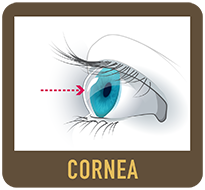Other Complications
Complications
 Rare infections of the cornea (the clear dome covering the colored part of the eye), called microbial keratitis, are among the most serious complications related to contact lens wear 2-4. Other complications that are commonly linked to contact lenses usually cause milder symptoms, or no symptoms at all 1, 5. They may resolve through temporarily not wearing contact lenses, or with eye drops prescribed by an eye doctor 1, 6. Some of these complications include:
Rare infections of the cornea (the clear dome covering the colored part of the eye), called microbial keratitis, are among the most serious complications related to contact lens wear 2-4. Other complications that are commonly linked to contact lenses usually cause milder symptoms, or no symptoms at all 1, 5. They may resolve through temporarily not wearing contact lenses, or with eye drops prescribed by an eye doctor 1, 6. Some of these complications include:
- Allergies affecting the eyes
- Giant Papillary Conjunctivitis: bumps that appear underneath the eyelid
- Corneal abrasion: a scratch or scrape on the cornea
- Contact Lens-induced Acute Red Eye (CLARE): red, irritated eyes
- Corneal infiltrates: irritation of the cornea indicating inflammation and possible infection
- Dry eyes
- Neovascularization: new blood vessels growing onto the cornea, sometimes causing eye redness
If You Have Symptoms
If you have any of the symptoms below, remove your contact lenses. If the symptoms continue after a couple of hours, or if they get worse, call your eye doctor.
- Irritated, red eyes
- Worsening pain in or around the eyes
- Light sensitivity
- Sudden blurry vision
- Unusually watery eyes or discharge
Prevention
Keep your eyes healthy while wearing contact lenses by following these tips, and always be sure to carry a pair of glasses with you—just in case you have to take out your contact lenses.
More Information
- American Academy of Ophthalmology (AAO). Eye Smart—Diseases & Conditions
- American Optometric Association (AOA) & American Academy of Optometry (AAO). Contact Lens Safety
- FDA. Contact Lens Risks
References
- Chalmers RL, Keay L, Long B, Bergenske P, Giles T, Bullimore M. Risk factors for contact lens complications in US clinical practices. Optom Vis Sci. 2010;87(10):725-35.
- American Academy of Ophthalmology. Contact lens-related eye infections. 2014 [cited 2014 1/3/2014].
- Keay L, Stapleton F, Schein O. Epidemiology of contact lens-related inflammation and microbial keratitis: a 20-year perspective. Eye Contact Lens. 2007;33(6 Pt 2):346-53, discussion 362-3.
- Dart JK, Stapleton F, Minassian D. Contact lenses and other risk factors in microbial keratitis. Lancet. 1991;338(8768):650-3.
- Efron N,Morgan PB, Hill EA, Raynor MK, Tullo AB. Incidence and morbidity of hospital-presenting corneal infiltrative events associated with contact lens wear. Clin Exp Optom. 2005;88(4):232-9.
- Chalmers RL, Keay L, McNally J, Kern J. Multicenter case-control study of the role of lens materials and care products on the development of corneal infiltrates. Optom Vis Sci. 2012;89(3):316-25.
- Page last reviewed: March 14, 2014
- Page last updated: March 14, 2014
- Content source:


 ShareCompartir
ShareCompartir